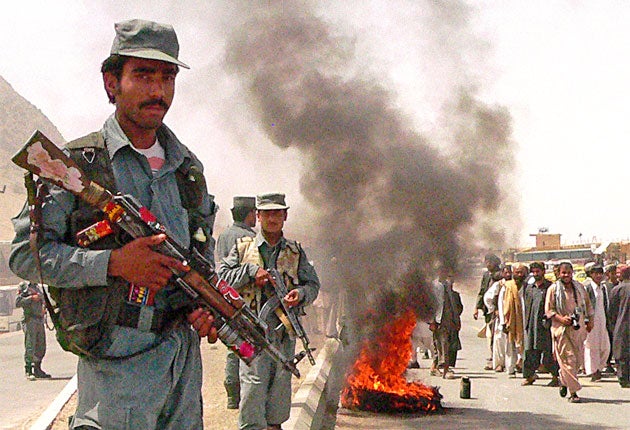Mosque murder leaves Kandahar on the edge
Deputy Mayor's assassination is latest in series of bloody attacks in city by Taliban as Nato prepares offensive

Assassins killed the deputy mayor of Kandahar yesterday as violence in Afghanistan's second city continued to spiral out of control before a planned Nato offensive.
Gunmen entered a mosque where Azizullah Yarmal was bowing his head in prayer and shot him at point-blank range, according to a spokesman for the governor of Kandahar.
It was the latest of a string of attacks in Kandahar City which has killed dozens of government employees. Hours earlier, a donkey laden with explosives was remotely detonated, killing three children from a prominent pro-government family.
The Taliban, which has said it is stepping up its campaign in Kandahar City as Nato and Afghan government operations gather momentum, claimed responsibility. They said that Mr Yarmal was killed because he "was working for this puppet government".
Nato has said that it plans to squeeze Taliban strongholds in the rural districts surrounding Kandahar, in southern Afghanistan, this summer with 15,000 additional troops. "It will be a series of individual rippling operations across Kandahar city and districts around it, led by the Afghan forces to improve security gradually, step by step, not in a big bang," Nato's top civilian official in Afghanistan Mark Sedwill said yesterday.
At the same time the alliance hopes to repair the city's political fabric by strengthening government institutions, sidelining local crime gangs and fostering a more inclusive form of government through the use of "shuras", or traditional councils.
Residents fear that fighting in outlying districts will displace enormous numbers of villagers, creating an influx of refugees. "The government carried out an operation in Marjah," said provincial council member Haji Moqtar Ahmed. "My thinking is [there was] no result. It failed... If they start without consulting ordinary people, thousands of families will move to Kandahar City. There will be great misery."
President Hamid Karzai and senior Nato officials have visited Kandahar City to promise tribal elders that no operation will take place without their consent. The reliability of this promise is openly doubted. Kandaharis fear that the coming months will be bloody.
On his blog, Alex Strick van Linschoten, a Dutch researcher who is one of only a handful of Europeans in Kandahar, reported a businessman predicting that Afghanistan's second city faced destruction.
"The storm is coming," the businessman said. "I try telling people, but it seems they're all just making themselves busy with fixing the leaky roof or the squeaky door. The storm will destroy their entire house and city, though. The storm is coming. You have two options: get out now, or climb down into your bunker and hope that the storm will pass and that you're still alive six months from now."
Last Thursday, the Taliban bombed a compound housing US-funded contractors working on development projects in Kandahar, killing three Afghans and injuring many more. According to US officials quoted in the Washington Post, this was just the latest indicator that insurgents are targeting development projects to prevent Nato and the Afghan government delivering services to the Afghan people as part of its bid to win them over.
Nato's strategy for Kandahar was partly tested in its campaign to restore government control over the town of Marjah in neighbouring Helmand. The campaign, which began in February, has been held up by the Taliban.
A Western diplomat cautioned that Kandahar posed a far more complex problem. "It's a daunting challenge. It is so much more complicated in Kandahar. And it gets much closer to the central power of the state and how one governs."
A recent Nato report backs up the notion that the insurgents are just one of Kandahar's problems. "This survey's findings indicate endemic corruption, along with a lack of security and basic services in Kandahar Province," it said. "Collectively, this sets conditions for a disenfranchised population to respond either by not supporting the government due to its inability to deliver improvements in the quality of life or, worse yet, by supporting the Taliban."
Join our commenting forum
Join thought-provoking conversations, follow other Independent readers and see their replies
Comments
Bookmark popover
Removed from bookmarks